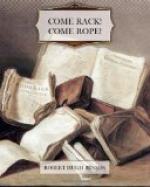Then, without warning (for so do great climaxes always come), the doors wheeled back on their hinges, disclosing a line of pikemen drawn up under the vaulted entrance; a sharp command was uttered by an officer at their head, causing the two sentries to advance across the bridge; a great roaring howl rose from the surging crowd; and in an instant the whole lane was in confusion. Robin felt himself pushed this way and that; he struggled violently, driving his elbows right and left; was lifted for a moment clean from his feet by the pressure about him; slipped down again; gained a yard or two; lost them; gained three or four in a sudden swirl; and immediately found his feet on wood instead of earth; and himself racing desperately as a loose group of runners, across the bridge; and beneath the arch of the castle-gate.
II
When he was able to take breath again, and to substitute thought for blind instinct, he found himself tramping in a kind of stream of men into what appeared an impenetrably packed crowd. He was going between ropes, however, which formed a lane up which it was possible to move. This lane, after crossing half the court, wheeled suddenly to one side and doubled on itself, conducting the newcomers behind the crowd of privileged persons that had come into the castle overnight, or had been admitted three or four hours ago. These persons were all people of quality; many of them, out of a kind of sympathy for what was to happen, were in black. They stood there in rows, scarcely moving, scarcely speaking, some even bare-headed, filling up now, so far as the priest could see, the entire court, except in that quarter in which he presently found himself—the furthest corner away from where rose up the tall carved and traceried windows of the banqueting-hall. Yet, though no man spoke above an undertone, a steady low murmur filled the court from side to side, like the sound of a wagon rolling over a paved road.
He reached his place at last, actually against the wall of the soldiers’ lodgings, and found, presently, that a low row of projecting stones enabled him to raise himself a few inches, and see, at any rate, a little better than his neighbours. He had perceived one thing instantly—namely, that his dream of getting near enough to the Queen to give her absolution before her death was an impossible one. He had known since yesterday that the execution was to take place in the hall, and here was he, within the court certainly, yet as far as possible away from where he most desired to be.
* * * * *
The last two days had gone by in a horror that there is no describing. All the hours of them he had passed at his parlour window, waiting hopelessly for the summons which never came. John Merton had gone to the castle and come back, each time with more desolate news. There was not a possibility, he said, when the news was finally certified, of getting a place in the hall. Three hundred gentlemen had had those places already assigned; four or five hundred more, it was expected, would have space reserved for them in the courtyard. The only possibility was to be early at the gateway, since a limited number of these would probably be admitted an hour or so before the time fixed for the execution.




